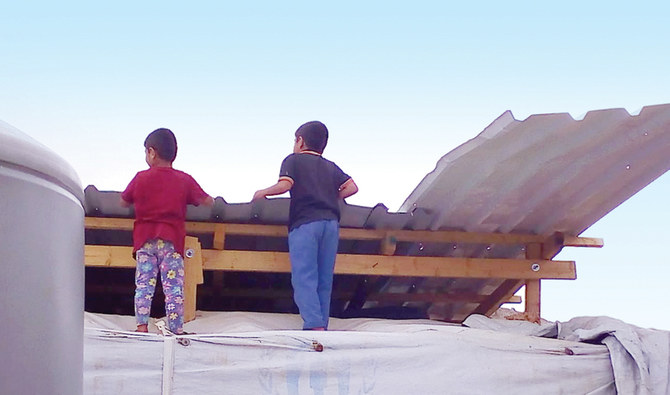BEIRUT: More than 35,000 Syrian refugees face being left homeless following a demand by Lebanese authorities for them to demolish makeshift walls and ceilings built inside their tents.
Civil groups say the Lebanese army has ordered refugees to rip down the structures by Monday.
A Syrian civil engineer, Aref Mohammed Satouf, who has been helping carry out the demolition work at the giant Arsal camp about 125 km northeast of Beirut, described the situation as “ridiculous.”
“My family and I fled Syria with the outbreak of the conflict there and took refuge in a tent like thousands of other refugees who live in Arsal,” he said.
“We used plastic sheeting to protect ourselves from the harsh weather in winter, but it was difficult. So, people built concrete floors and walls to allow them to stay without getting buried under the snow. We also built walls inside the tent to separate the sitting area from the bathroom.”
Satouf added: “The Lebanese government gave its decision to demolish the walls, and we do not mind at all, but the instructions we have received are inconsistent.”
Lebanon’s Higher Defense Council, headed by President Michel Aoun, issued its ruling during a meeting in April attended by the prime minister, interior and defense ministers, and security leaders.
Arsal Mayor Basil Hujairi, said: “The demolition decision includes more than 2,500 tents with stone walls built inside as well as ceilings.”
He said walls with a height of 2.5 meters had to be knocked down or reduced to only 1 meter. “People have started to abide by the decision, and demolitions are being carried out, but people are also facing difficulty and confusion.
“For example, there is currently heavy rain even though it is summer. The region has harsh weather during winter, with temperatures dropping to between 6 and 12 below zero, and during summer there are floods caused by melting snow on the eastern mountain range. Also, the snow in Arsal piles up half a meter high every year,” added Hujairi.
Lebanon fears that building work inside tents could represent the start of resettlement or permanent residence of Syrian refugees in the country on similar lines to Palestinians.
But 430 civil associations and activists have described the thinking as “illogical because the situation is different. Palestinians have lost their land and become occupied by another entity, while Syrians have not lost their passports and their government is welcoming them.
“It is also unrealistic to consider the cessation of war in some areas in Syria a sufficient and legitimate justification for the return of refugees.”
SPEEDREAD
Clashes between Syrian refugees and Christians in Deir El-Ahmar, a town in the Bekaa, saw a camp set on fire after refugees fled after claiming they had received threats.
In a memorandum signed by the civil associations, they noted their “fear of pressure on Syrian refugees to force them to return to Syria, and this is contrary to Lebanon’s international obligations.”
The communication pointed to “the lack of an infrastructure and health structures in Syria, reprisals, demographic changes, changes in the protecting environment, the existence of nongovernment militias that are not under the control of the central government in Syria, and the absence of a solution for the compulsory army service, dissidents and deserters.”
The associations, which work with Syrian refugees, said that about 7,000 tents at camps in Arsal, the Bekaa and in northern Lebanon had stone walls and were inhabited by thousands of refugees, most of them registered with the UN High Commissioner for Refugees (UNHCR).
They believed that “the decision to remove the stone walls and tin and zinc ceilings means leaving more than 35,000 Syrian refugees homeless and without alternatives, noting that most of these refugees are from Syrian areas that suffer very poor security and economic conditions.”
Arsal alone houses 65,000 Syrian refugees, 45,000 of whom benefit from UNHCR assistance.
Hujairi said: “What is the difference if a wall’s height is 2 meters or 1 meter? And how can a wooden ceiling or plastic sheeting be acceptable, but not other types of ceilings?”
Meanwhile clashes between Syrian refugees and Christians in Deir El-Ahmar, a town in the Bekaa, saw a camp set on fire after refugees fled after claiming they had received threats.
Hujairi said refugee authorities were trying to track down around 1,500 people who had left the camp.
Lebanese MP Marwan Hamadeh, said: “Because of the ethnic and sectarian incitement practiced by some authorities, Lebanon may lose the image it has built during the past years as a country that hosted refugees and treated them humanely.
“Now, after the vague decisions of the so-called Higher Defense Council, which has not been vested with procedural powers that only belong to the Cabinet, some local bodies and extremists, especially those associated with the authority, are inciting against camps and refugees and turning each incident into a reprisal.
“This means demonizing every foreigner, increasing tension inside Lebanon and destroying Lebanon’s reputation among Arab countries and the international community at a time when we seek the necessary aid and investment to revive our economy.”
Refugee Satouf added: “The people in the camps are lost. There is no clear information, it is all inconsistent. The Lebanese army informed us that we must reduce the walls’ height to 1 meter, the municipality provides different instructions, and the UNHCR gives other information.
“What about the shared walls separating the tents? If we demolish one wall, two or more attached tents will be destroyed. The army has allowed us to keep a wall that separates tents, as well as one to separate bathrooms, but it refused to allow a wall to separate shower and bathing areas.”
Satouf pointed out that families do not receive wood and sheeting to complete pitching the tent until they are sure these will not get demolished, which might take several days during which time families remain homeless while waiting for wooden pillars to hold the sheeting.

























